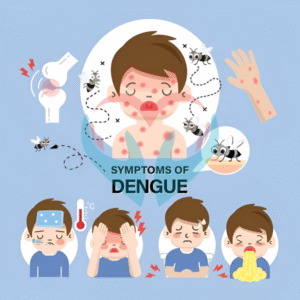Every rainy season, dengue fever becomes a growing concern across Bangladesh. Unlike a seasonal flu, dengue can get dangerous very quickly. Almost every family knows someone who has been affected.
Recognizing the early symptoms of dengue fever and acting quickly can make all the difference. In this guide, you’ll learn:
-
The 7 early signs of dengue fever.
-
Which dengue test names doctors recommend.
-
What a dengue IgG positive result means.
-
How and when platelet count changes.
-
Simple prevention methods.
👉 With platforms like Sasthaseba, you can easily book online doctor consultations or dengue tests without leaving home.

What is Dengue Fever?
Dengue fever is a mosquito-borne viral infection caused by the Aedes aegypti mosquito. These mosquitoes are most active in the early morning and late afternoon.
In Dhaka and other parts of Bangladesh, cases increase sharply during the monsoon when stagnant water becomes mosquito breeding sites. While many people recover with proper care, some cases develop into severe dengue, which can be life-threatening.
🔗 For more details, see the World Health Organization on Dengue.
7 Early Symptoms of Dengue Fever
Here are the first warning signs you should never ignore:
1. Sudden High Fever
A sudden fever above 102°F (39°C) is the earliest sign. Unlike flu, it does not reduce quickly with paracetamol.
2. Intense Headache
Patients describe it as a pounding pain, usually in the forehead.
3. Pain Behind the Eyes
Eye pain or discomfort when moving the eyes is a unique dengue symptom.
4. Severe Muscle and Joint Pain
Called “breakbone fever”, dengue often causes intense muscle and joint aches, leaving patients weak.
5. Nausea and Vomiting
Stomach upset and repeated vomiting are very common in the early phase.
6. Skin Rash
A red, patchy rash often appears after 2–5 days of fever. These spots usually show up on the chest, arms, or legs.
7. Extreme Fatigue
Unusual tiredness, even after resting, is a sign your body is struggling with infection.
⚠️ Tip: If you notice two or more of these symptoms, get a dengue test immediately.
Dengue Test: How to Confirm Dengue Fever
Doctors often recommend blood tests to confirm dengue. The most common dengue test names include:
-
NS1 Antigen Test – Detects infection within the first 5 days.
-
Dengue IgM Test – Shows recent infection.
-
Dengue IgG Test – Indicates past infection or later stage.
💡 Many people ask:
-
“Dengue IgG positive means what?”
👉 It means you may have had dengue before or you’re in the later stage of infection. -
“Is dengue IgG positive dangerous?”
👉 Alone, it’s not always dangerous. But if you currently have fever and symptoms, it may indicate a reinfection — which can be more severe.
🔗 Learn more from the CDC’s Dengue Guidance.
👉 You can easily book dengue tests online through Sasthaseba’s diagnostic services.
When to Seek Urgent Care
Most dengue patients recover at home, but severe dengue requires hospitalization. Rush to the hospital if you notice:
-
Continuous vomiting
-
Severe abdominal pain
-
Bleeding gums or nose
-
Blood in stool or vomit
-
Breathing difficulties
-
Extreme tiredness or restlessness
These are red-flag symptoms that should not be ignored.
Platelet Count in Dengue: What to Expect
A major concern during dengue is falling platelet count.
-
When do platelets drop?
Usually after the first 3–4 days of fever. -
When will platelet count increase in dengue?
Platelets generally rise again after the fever subsides, usually by day 7–10. -
How to increase platelet count in dengue?
There’s no instant fix. Doctors recommend:-
Staying hydrated.
-
Complete bed rest.
-
Monitoring platelet count daily.
-
Some patients try papaya leaf extract, but only under medical guidance.
-
👉 Don’t rely on home remedies alone. Always consult a doctor through Sasthaseba Online Consultation.
Can Dengue Fever Be Prevented?
Yes, prevention is possible with simple lifestyle and community steps:
-
Eliminate stagnant water – Buckets, plant pots, tires, and construction sites.
-
Use mosquito nets and repellents – Especially at dawn and dusk.
-
Wear protective clothing – Long sleeves and pants.
-
Community clean-up drives – Collective efforts reduce dengue outbreaks.
Why Early Diagnosis Matters
Recognizing the early symptoms of dengue fever and testing quickly can prevent complications. A timely dengue test helps doctors track platelet levels and hydration.
💡 Platforms like Sasthaseba allow you to book doctor consultations and diagnostic tests online, ensuring safer and faster care.
FAQs on Dengue Fever
Q1. What is the first dengue test name doctors suggest?
👉 The NS1 Antigen test, especially within the first 5 days of fever.
Q2. Dengue IgG positive means what?
👉 It usually means past infection or later-stage dengue.
Q3. Is dengue IgG positive dangerous?
👉 Alone, no. But with fever and symptoms, it may mean reinfection, which can be more serious.
Q4. When will platelet count increase in dengue?
👉 Platelets usually rise once the fever subsides, between day 7–10.
Q5. How to increase platelet count in dengue?
👉 No quick cure. Hydration, medical advice, and proper rest are most effective.
Dengue fever is not just another seasonal illness. If caught late, it can become life-threatening. But with awareness, early testing, and proper medical care, recovery is usually smooth.
This monsoon, protect yourself and your family. Keep your surroundings clean, watch for the early symptoms of dengue fever, and consult a doctor without delay.
Stay safe, stay aware, and let’s fight dengue together.
